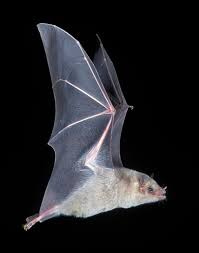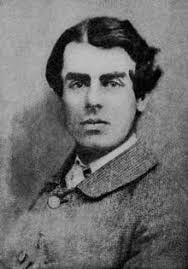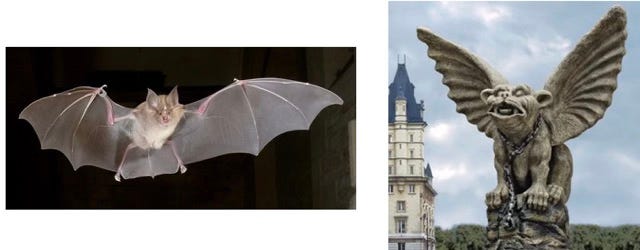All animals except for man know that the principal business of life is to enjoy it. — Samuel Butler
What a witty opening to a poem, especially one that’s addressed to a bat. The poet is speaking to the injured bat, which, for a moment, she mistakes for a sheet of carbon paper blowing down the street. Soon the wit changes to compassion, fellow-feeling for an injured untouchable, one so different from the poet and from every human that it might as well be a space alien dropped to earth.
“Using your wings like crutches” — we don’t know what injured the bat, nor how severe the injury. Poor creature, we think. Most of us have witnessed similar scenes of distress…injured animals that we dared not touch for fear of bites, even the risk of rabies. Bats, like other mammals, are known carriers of the horrific disease.
In the second stanza, the poet looks at the bat’s “little cat ears.” Have you ever been close enough to a bat to notice such a detail? I haven’t. Take a look at the photo: yes, they could be the ears on any cat. And yes again — bats and gargoyles are similarly shaped.
I like that twisty little line in stanza two. It should probably be read with this emphasis: “as if I were what you were made to scare off.” The poet would like to help, but the bat seems created precisely to prevent her doing so. She is torn, wanting to help but not daring to. She would like to return to a childlike belief in nature as kind and proper. Young children are spared the knowledge that stars are made of deadly firestorms and not pure, gentle light. Many children do not fear animals until they learn to do so.
The final lines jump to a wildly unexpected comparison of Jesus crucified, rejected, his body broken: “a…God nobody wants.”
The final phrase lifts the poem from the fallen bat, desperately trying to limp onto the safety of a lawn, to a higher plane. Referring to the phenomenon of echolocation, the poet wonders what meaning the bat’s singing sonar might have in this strange universe that no one comprehends.
[This note from Wikipedia: Echolocation, also called bio sonar, is a biological active sonar used by several animal groups, both in the air and underwater. Echolocating animals emit calls and listen to the echoes of those calls that return from various objects near them. They use these echoes to locate and identify the objects. Echolocation is used for navigation, foraging, and hunting prey.]
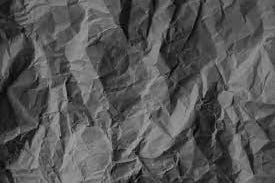
In her email giving me permission to reprint the poem, Betsy Sholl added a note about the circumstances that produced it:
I was jogging when I came across that bat and did mistake it for carbon paper before I got close enough to see more clearly. In a sense I was just trying to put words to the experience. But if I think about it, I had recently been in Austin, Texas, for my sister’s memorial service and had visited the famous bridge where the bats fly out at dusk, so that was on my mind along with the death of my sister. Also, in my neighborhood there is a house with a gargoyle on its roof. Because of all the cultural associations with bats, not to mention rabies, I found myself reluctant to help it, which created a real tension for me, between fear and compassion. The import of the experience seemed to increase the more I considered it. But all this is in retrospect, of course. I was also struck by the whole issue of how we see and miss-see, have to look again, see what we missed, rethink what we are seeing.
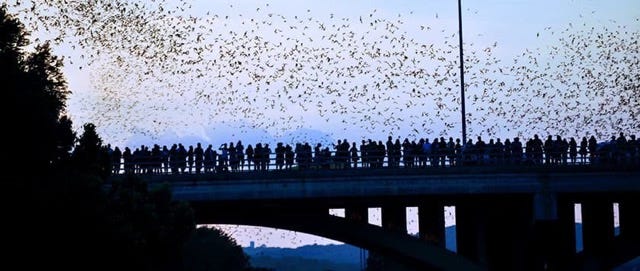
Used with permission of the poet. “To a Bat Fallen in the Street” appeared originally in The House of Sparrows by Betsy Sholl, published in 2019 by the University of Wisconsin Press.
The Poetry Zoo is my online anthology of poetry about animals. It is free to all readers, and will continue to be so. I hope, however, that you will consider making a contribution to PETA (People for the Ethical Treatment of Animals). More on PETA in a later post. Donate to PETA

